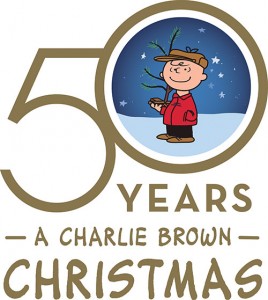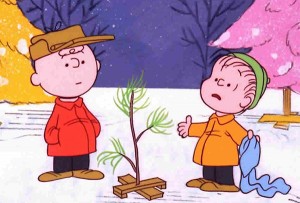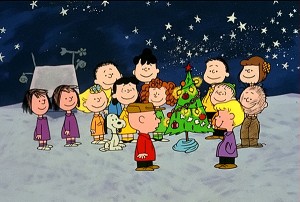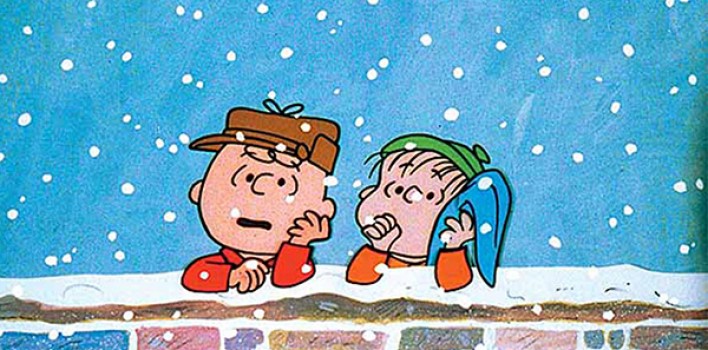50 Years of A Charlie Brown Christmas
 As you know from my recent review of The Peanuts Movie, I am very fond of the Peanuts universe. The Peanuts characters have a unique sense of honesty and sophistication, delivered in a very straightforward manner, that I have enjoyed since I was a child.
As you know from my recent review of The Peanuts Movie, I am very fond of the Peanuts universe. The Peanuts characters have a unique sense of honesty and sophistication, delivered in a very straightforward manner, that I have enjoyed since I was a child.
Through Charles Schulz’s brilliant comic strips, I laughed, learned and felt some very deep emotions. I sympathized with Charlie Brown’s struggles and insecurities. He taught me the good lessons of “keep on keeping on” and never giving up. Naturally, my love for the comics drew me toward the animated specials.
My favorite slice of the Peanuts media pie is A Charlie Brown Christmas. It is simply the greatest Christmas-themed television special of all time, period. Media today is dominated by material vying to become the next “Christmas classic” (even going so far as to preemptively label themselves as such), yet none of them can compare to the sincerity and simplicity of A Charlie Brown Christmas.
Like most classics, A Charlie Brown Christmas did not set out to become one. In fact, all of the principal creative forces involved – a fairly successful cartoonist, an eccentric animator, and a documentary filmmaker – thought it was going to be a complete disaster. Even the TV network that aired the show didn’t believe in it. The overwhelmingly positive reactions astounded all of them.
A Charlie Brown Christmas has aired every year since its debut fifty years ago, and has become a cultural staple – touching the lives of millions of people across multiple generations. The creators reached something in everyone, something innate and fundamental. And none of them realized it at the time, except perhaps Charles Schulz himself.
“I almost wish there wasn’t a holiday season. I know nobody likes me. Why do we have to have a holiday season to emphasize it?”
The making of A Charlie Brown Christmas was a minor miracle in itself. The Coca-Cola Company was looking to sponsor a Christmas special and asked producer Lee Mendelson if he had one. Mendelson said he did, even though he actually didn’t. He had less than three days to pitch the idea, and immediately went to see his friend Schulz about doing a Peanuts-themed special.
To supervise the animation and help come up with the story, Schulz and Mendelson connected with Bill Melendez. Schulz had liked what Melendez had done with a series of Ford commercials in the late 1950s and early 1960s starring his Peanuts characters.
Melendez was the perfect choice, as his more impressionistic sensibilities worked well with Schulz’s drawing style. Melendez respected Schulz as an artist, and it was important to Melendez that the characters maintain their “drawn” look, even in animation.
Melendez used “limited animation” that emphasized very little full-body movement (for example, if a character is walking, only the legs move) and graphic appearance over realism. This outside-the-box thinking made its way to virtually all aspects of the production.
Jazz composer Vince Guaraldi was hired to create a mid-century jazz soundtrack that matched Schulz’s sophisticated prose beautifully. Actual children provided voices for the characters at a time when adults usually filled those roles. There was also no laugh track, which was a staple of children’s programming (how else would the children know when to laugh?).
CBS did not take too kindly to all of this bucking of conventional thinking. When they screened the special prior to airing, all of the network executives hated it. But because it was finished with no time left, they had no choice but to air it. Based on the horrible reaction from the network, Schulz, Melendez and Mendelson all thought they had failed.
“This is one Christmas play that’s not going to be commercial!”
 The most controversial aspect of A Charlie Brown Christmas was, ironically, its references to Christ’s birth, specifically Linus’ moving monologue derived from Luke 2:8-14.
The most controversial aspect of A Charlie Brown Christmas was, ironically, its references to Christ’s birth, specifically Linus’ moving monologue derived from Luke 2:8-14.
Even Melendez and Mendelson were apprehensive about quoting Scripture in a cartoon. Despite their misgivings, Schulz simply stated, “If we don’t do it, who will?”
Schulz’s simple retort reflected the honest, straightforward style of his comic strips. He wasn’t afraid to plainly explain what Christmas was all about because that kind of honesty was the cornerstone of Peanuts. This monologue is the entire point of the special, and why it continues to be so beloved five decades after its first broadcast.
The theme of A Charlie Brown Christmas is the danger of the commercialization of what should be a sacred holiday. Charlie Brown is lost in the worldly, material requirements for Christmas. Everyone he interacts with is more concerned about the commercial trappings than the actual event being celebrated.
The commercialization of Christmas has increased significantly since 1965, so the ultimate message of A Charlie Brown Christmas resonates even more today. Unlucky shoppers are literally trampled each year by swaths of people eager to gobble up a deal on Black Friday. There are contests on TV where someone’s “Christmas spirit” is measured by how many lights they can throw on their house. And, of course, millions of children are told that a jolly, omniscient man in a red suit will fulfill all their desires.
“That’s what Christmas is all about, Charlie Brown.”
In the midst of all the commercial fuss and mess of a play, Charlie Brown desperately asks if anyone knows what Christmas is all about. Linus does not hesitate to step center stage and proclaim the true meaning of Christmas by reciting Scripture.
From that one monologue, Charlie Brown understands. This is what makes this “special” truly special.
While other Christmas movies and TV specials like Dr. Seuss’ How The Grinch Stole Christmas do indeed emphasize that Christmas is about more than material things, A Charlie Brown Christmas goes beyond them all and brings the message home by explaining what all the celebration and merry-making is truly about.
The story of the birth of Jesus is a very simple, yet profound, narrative – literally changing the fate of mankind. It is a perfect fit for this special due to the world of Peanuts also being simple yet profound. As a reflection of his faith, Schulz already had his characters quoting and referencing the Bible in his comic strips. This made it a natural transition.
In an interview in 2008, Schulz’s widow Jeannie related that her husband was deeply offended by some believers who thought that Scripture was too sacred to be recited in something as “crass” as a comic strip.
“I think he probably felt that the Bible verses aren’t just for church. They’re not [just] for the priesthood. They’re for everyone.”
Virtually all of the letters received by Schulz, Mendelson and Melendez regarding A Charlie Brown Christmas were thank-you notes about including the Scripture in the special.
“Merry Christmas, Charlie Brown!”
 The message of A Charlie Brown Christmas continues to bring special meaning in a very personal way. Growing up, I loved Christmas. Like Charlie Brown, I liked getting presents and decorating the tree, but I was constantly nagged by this feeling of why. Why were we celebrating? I derived what we were celebrating from the Christmas carols we sang, but no one really explained why.
The message of A Charlie Brown Christmas continues to bring special meaning in a very personal way. Growing up, I loved Christmas. Like Charlie Brown, I liked getting presents and decorating the tree, but I was constantly nagged by this feeling of why. Why were we celebrating? I derived what we were celebrating from the Christmas carols we sang, but no one really explained why.
This special always resonated with the true spirit of Christmas in my mind. Yet it wasn’t until I became a Christian over ten years ago that I fully understood the why – the good news of the birth of my Savior.
Today people are still caught up in the frenzy to make Christmas complicated. We all need to remember to pause, slow down, and most importantly, remember the Baby in the manger. To be cliché, He’s the reason for the season. That one simple concept overshadows everything else about this season in such a powerful way. I’m glad Charles Schulz had the courage and conviction to get the story right.








